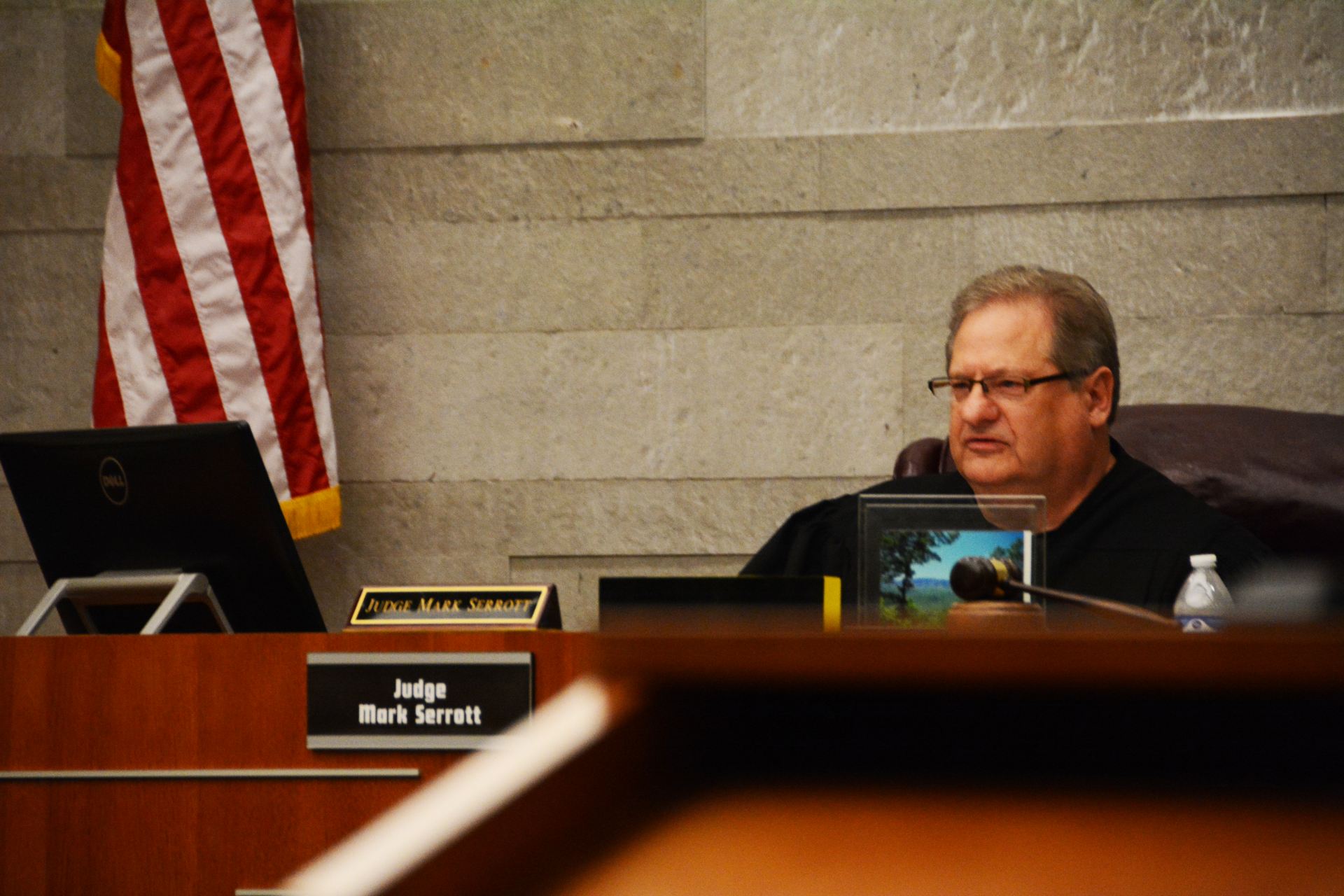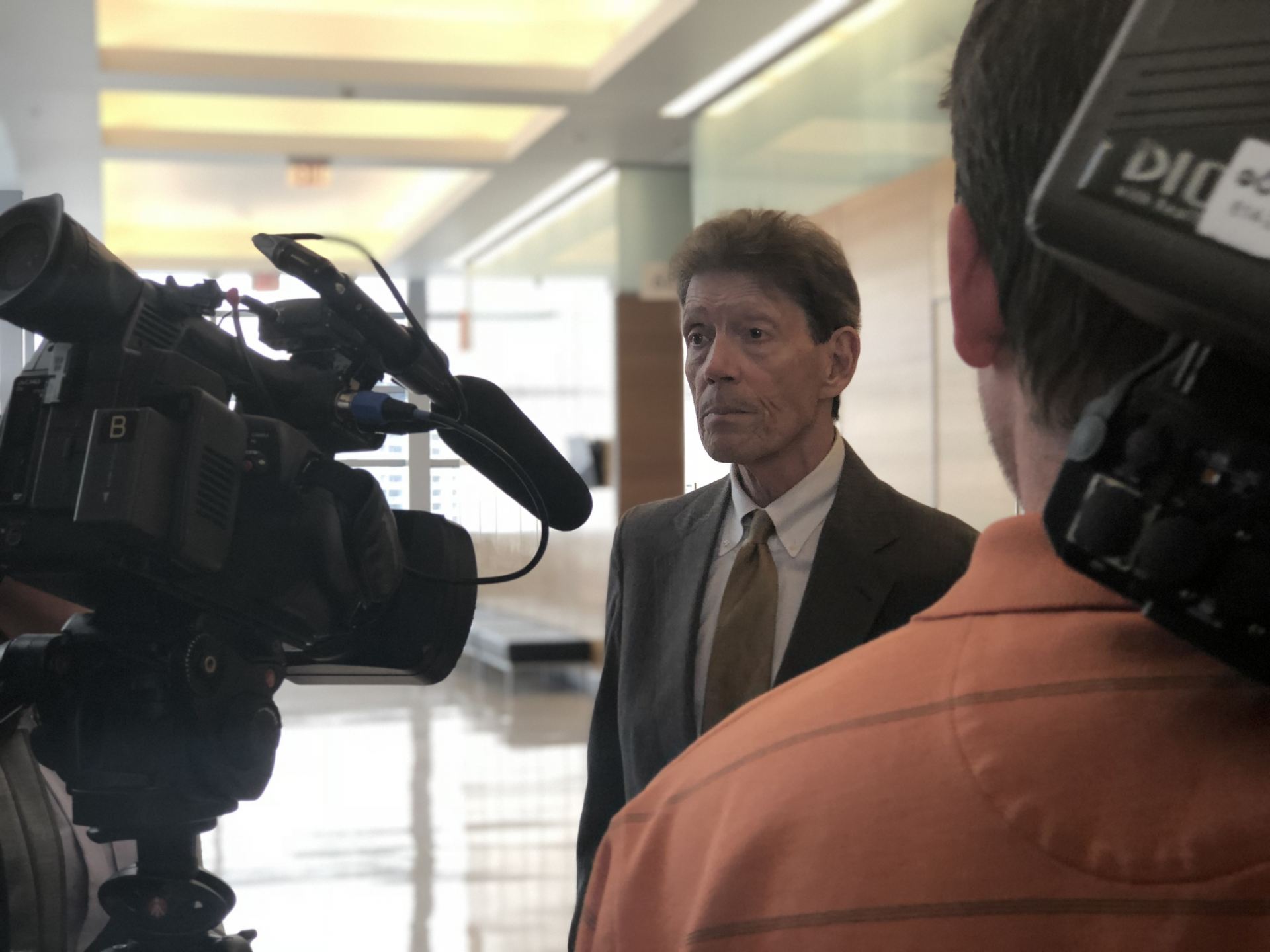
Judge Mark Serrott followed the jury’s recommendation Wednesday and sentenced Golsby to life in prison without the possibility of parole. Credit: Kevin Stankiewicz | Editor in Chief
The rest of Brian Golsby’s days will be spent behind bars.
Judge Mark Serrott followed the jury’s recommendation Wednesday and sentenced Golsby to life in prison without the possibility of parole.
Golsby, who was convicted March 13 of kidnapping, raping and murdering Ohio State student Reagan Tokes last February, had his life was spared because the jury didn’t unanimously agree on the death penalty. Eight were in favor of it while four were not, according to a member of the jury who spoke to the media following the decision.
Though it was not the sentencing the prosecution was hoping for, Franklin County Prosecutor Ron O’Brien said after the jury’s sentencing that he and the Tokes family respected the decision.
“The good news is, I think for us, is Mr. Golsby will die in prison,” he said, adding the family and prosecution will not be “mired in 20 years of post-conviction litigation” that often comes with a death penalty sentence.
In reading the sentencing, Serrott spoke passionately and directly to Golsby. Serrott noted Golsby’s troubled upbringing, but emphasized that he alone is responsible for his choices.
You get spared because of your background, and yet she forfeited her life. —Judge Mark Serrott, to Brian Golsby, in court during Golsby’s sentencing.
“You need to understand she did nothing wrong,” Serrott said, his voice raising with emotion.
“Your life got spared because at least four members of the jury, maybe less, more, something in that neighborhood, felt that [your upbringing] were mitigating so your life got spared because of your childhood. Yet Reagan did nothing wrong, whatsoever, and yet she forfeited her life because of your background. You get spared because of your background, and yet she forfeited her life.”
“She did nothing wrong — except be at work.”
O’Brien said the Ohio law that prevented the prosecution from including testimony from the Tokes family during sentencing hindered the prosecution’s case for Golsby to be sentenced to death. That law, he said, allows only evidence from the defense to be presented during sentencing, which in this trial included the questioning of psychologists who visited and analyzed Golsby.
“If they heard about effect on family, it could have made a difference regarding death penalty,” O’Brien said.

Franklin County Prosecutor Ron O’Brien speaks to media after the jury releases its sentence. Credit: Summer Cartwright | Campus Editor
The defense attorneys for Golsby all but admitted his guilt during the trial, something attorney Kort Gatterdam said affected the jury in their decision.
“You have to have credibility with the jurors,” he said. “When there are things that go against you, admit it. Don’t play games with them. Again, without going through specific names, they appreciated that.”
Defense attorney Diane Menashe said her decision to be upfront with the jury benefited Golsby in the trial.
“They told us that,” she said. “In the jury room, they said we appreciated you were authentic and honest and picked your battles.”
Deliberation was intense, said a juror named Monica who wanted to be identified only by her first name.
“Brian Golsby has been through a lot. The mitigating factors to some outweighed the aggravated [factors],” Monica said. “To some, it was the opposite. To some, they just weighed out what they believed.”
She said the decision was more difficult than jurors anticipated, saying outsiders would believe Golsby’s death as the only logical sentence.
“It was very intense and very stressful,” Monica said of the trial and its discussions. She said the deliberations focused on the previously convicted felon’s upbringing. Earlier in the week, a psychologist detailed traumatic events in Golsby’s life that were called a “recipe for disaster,” a concoction that altered his life and his decision-making into that of a murderer, rapist and robber.
“I believe there is a point in anyone’s life where they and they alone are responsible for their decisions, and they alone are the ones that should suffer the appropriate penalties,” O’Brien said. “I believe that Golsby, at age 29, despite whatever happened to him when he was a youngster, that he, alone, is responsible for that and that he, alone, should suffer from the penalty.”
Through the difficulty, Monica decided on what she believed to be the proper sentence for Golsby: death.
You asked for mercy, sir, and you showed none. It’s ironic to me that you stood before the jury, and I don’t know if you were genuine or not, I can’t look into your mind, and you asked them for mercy but showed none when she asked for it. —Judge Mark Serrott, to Brian Golsby
When asked why, Monica answered in two words: “Reagan Tokes.”
“Why let him live when he didn’t let her live?” she asked.
But since Golsby will live, the judge challenged him to do something positive while spending the remainder of his life in a cell. Serrott also brought up irony in Golsby’s plea for his life being successful when Reagan’s plea went unanswered by Golsby.
“Maybe nobody can believe that or see that, but I believe in redemption, and you better take this opportunity to do something constructive while you’re in prison,” Serrott told Golsby. “Your lawyers got your life spared for you.”
“You asked for mercy, sir, and you showed none [on Feb. 8, 2017]. It’s ironic to me that you stood before the jury, and I don’t know if you were genuine or not, I can’t look into your mind, and you asked them for mercy but showed none when she asked for it.”
Updated March 21, 2018 at 9:31 p.m. to add comments from Judge Mark Serrott.


